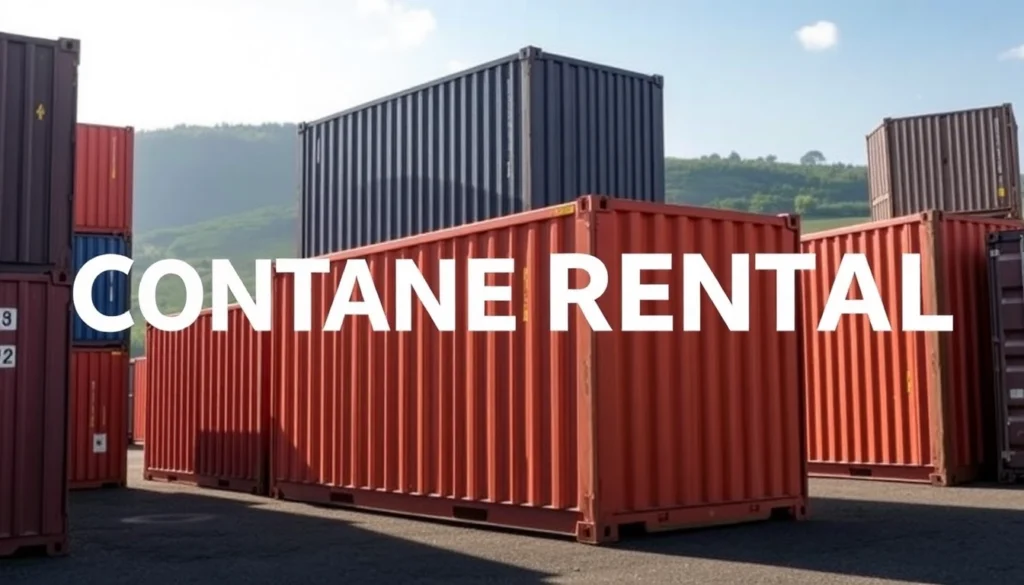
In today’s dynamic commercial and industrial landscape across the UK, container rental has emerged as a versatile, cost-effective solution for storage, transportation, and site management needs. Whether you are managing a construction project, expanding your business storage capacity, or requiring secure temporary solutions, understanding the nuances of Container rental can help you optimize operations, minimize costs, and ensure compliance with UK regulations. This comprehensive guide delves into the essentials of container rental, exploring types, benefits, selection criteria, implementation strategies, and ways to maximize your investment.
Introduction to Container Rental in the UK
Container rental services have revolutionized the way businesses and organizations in the United Kingdom approach storage, logistical, and site accommodation challenges. Traditionally, owning physical assets like storage containers or modular units meant high upfront costs and maintenance commitments. However, container rental offers flexibility, scalability, and cost efficiency by providing temporary or long-term solutions tailored to specific operational needs.
UK businesses benefit from a burgeoning industry that offers a wide selection of container sizes, configurations, and features. From small 10ft units ideal for individual site storage to expansive 45ft high-cube containers suited for large-scale logistics, the options are extensive. This growth is driven by increasing demand for adaptable solutions that can be deployed rapidly, moved easily, and customized for diverse applications.
Organizations such as construction companies, event organizers, manufacturers, and even retailers leverage container rental to address challenges like equipment storage, on-site offices, secure document safekeeping, and emergency response logistics. As the industry matures, understanding the full scope of container rental services can provide your organization with a decisive strategic advantage.
Understanding Container Rental Services
Container rental services encompass a broad spectrum of offerings designed to meet varying needs. At their core, these services provide clients with containers on a temporary basis, complete with delivery, installation, and removal, often with flexible rental periods. They serve as a practical alternative to purchasing, reducing capital expenditure and providing operational agility.
Leading container rental providers in the UK offer comprehensive packages that include different container types, customization options, security features, and logistical support. The rental process typically involves selecting the appropriate container size and type, arranging delivery to the desired location, and managing ongoing logistics and maintenance.
Choices range from standard steel storage units to specialized units like refrigerated containers and modified units for accommodation or office use. Rental agreements can be structured for as short as a few weeks or extended over several months or years, often with options for renewal or purchase at the end of the term.
Understanding the scope and capabilities of container rental services is key to integrating them effectively into your operational framework. This not only ensures you select the right container for your project but also optimizes your overall logistical efficiencies.
Types of Containers Available for Rent
The UK market offers a diverse array of container types, each tailored for specific functions and industries. The most common categories include:
- Standard Shipping Containers: Often 20ft or 40ft steel units, these are designed for goods transport and storage, featuring durable construction and weatherproofing.
- High-Cube Containers: These variants extend height to provide extra storage capacity, ideal for bulky or volume-intensive goods.
- Refrigerated Containers (Reefers): Equipped with climate control, these units are perfect for perishable goods, pharmaceuticals, or sensitive materials.
- Open-Top Containers: Designed with removable roofs, facilitating oversized cargo or bulk materials that require crane loading.
- Flat-Rack Containers: Used for oversized or irregularly shaped items that don’t fit into standard containers.
- Specialized Modified Containers: Customized for specific purposes, such as mobile offices, restrooms, or site accommodations.
Each container type varies in size, features, and security options, allowing businesses to choose solutions that best fit their operational requirements. For example, construction sites often prefer robust steel containers with high security locks, while event organizers may opt for portable office units.
Why Choose Container Rental Over Buying?
While purchasing containers might seem attractive for long-term needs, rental services offer multiple compelling advantages, especially in the context of UK’s evolving market demands:
- Cost Savings: Rental eliminates the high upfront investment associated with purchasing. You pay for usage, reducing capital expenditure and allowing funds to be allocated elsewhere.
- Flexibility & Scalability: Rentals can be scaled up or down based on project size or seasonality. Need more storage in peak periods? Simply extend your rental or upgrade to larger units.
- Maintenance & Support: Rental providers typically handle repairs, upkeep, and logistical support, relieving your team from maintenance burdens.
- Rapid Deployment & Removal: Renting enables quick setup and teardown, critical in time-sensitive projects or emergency situations.
- Access to Latest Technology & Models: Renting allows access to newer, more secure, and technologically advanced containers without the risk of asset obsolescence.
Cost analyses indicate that for temporary or seasonal needs, rental remains significantly more economical than ownership. Moreover, rental agreements often include insurance options and security, further reducing your administrative overhead.
Key Factors When Selecting a Container Rental Provider
Choosing the right provider is fundamental in maximizing the benefits of container rental. Several factors influence this decision, from cost considerations to service quality:
Assessing Rental Costs and Flexibility
Examine rental prices, which can vary based on container size, type, rental duration, and additional features like climate control or security enhancements. Obtain detailed quotes and compare offerings against your budget. Also, consider rental flexibility—does the provider offer short-term leases, extensions, or purchase options? Transparent pricing with no hidden fees is essential.
For example, some providers charge a flat weekly rate, while others may have variable pricing based on demand or specific services included. Make sure to review the terms for delivery costs, late return penalties, and damage charges.
Delivery, Collection, and Location Considerations
Logistics are crucial. The provider must offer reliable delivery and collection services within your site location in the UK. Confirm the availability of local depots or mobile units for quick turnaround times. Ensure the provider can accommodate access restrictions, such as narrow roads or tight spaces, and provides flexible scheduling.
Quality, Security, and Container Types
Container quality impacts longevity and security. Ask about the materials used, weatherproofing standards, and security features such as lockboxes or security seals. For sensitive or valuable contents, security is paramount. Additionally, ensuring containers meet UK safety standards and have certification for fire safety and structural integrity is essential.
Assess whether the provider offers customized or modified containers if your project requires specific features such as additional ventilation or insulation.
Designing the Perfect Container Solution for Your Needs
An optimized container setup involves selecting, customizing, and managing units that fit your specific operational goals. Thoughtful planning ensures maximum utility, security, and compliance.
Customizable Container Options and Modifications
Many UK container rental companies offer on-site modifications, including insulation, shelving, electrical wiring, or branding. For instance, building a mobile office might involve outfitting the container with desks, Wi-Fi, and security cameras. This tailored approach reduces the need for multiple providers and streamlines operations.
Furthermore, modular containers can be combined or stacked, creating larger spaces or multi-functional units, essential in busy construction or event sites.
Best Practices for Efficient Space Management
Effective space utilization involves strategic arrangement and inventory management. Use clear labeling, shelving, and security measures to optimize storage density. Plan for easy access paths and consider weather or security risks when positioning containers.
Digital inventory tools or container management software can track contents, monitor occupancy, and improve allocation efficiency.
Ensuring Compliance with UK Storage Regulations
Operate within UK legislation governing storage, health and safety, and environmental standards. Ensure containers have proper safety signage, fire extinguishers, and security measures. For mobile or converted units, adhere to building control and planning permission requirements if applicable.
Consult with local authorities or legal experts to ensure full compliance, especially when modifying containers or using them for specific purposes like accommodations or retail.
Implementation: Setting Up Your Container Rental System
Effective deployment involves a systematic approach from selection to ongoing management. Follow these steps to ensure a smooth setup:
Step-by-Step Rental Process
- Needs Assessment: Clarify your storage or operational needs, including size, features, duration, and security requirements.
- Research & Selection: Compare providers based on cost, reputation, service offerings, and location.
- Quotation & Agreements: Obtain detailed proposals, review terms, and sign rental contracts. Ensure clarity on delivery, access, and liabilities.
- Scheduling Delivery & Setup: Coordinate with the provider for timely delivery and installation, considering your project timeline.
- Container Use & Monitoring: Implement space management protocols and security measures.
- Collection & Evaluation: Upon rental completion, arrange for pickup and evaluate the experience for future optimizations.
Maintaining and Securing Rented Containers
Regular inspections, security audits, and proper occupancy management are vital. Use high-quality locks, security seals, and surveillance if necessary. Maintain containers by checking for rust, leaks, or damage, and coordinate repairs through your provider.
Scaling Your Container Infrastructure for Growth
As your operations expand, scale your container fleet accordingly. Opt for providers that offer flexible leasing plans and easy replacement or addition of containers. Consider integrating container management software for streamlined oversight.
Measuring Success and Optimizing Your Container Use
Continuous evaluation ensures your container system remains efficient, secure, and cost-effective. Focus on key performance indicators (KPIs) and feedback loops.
Tracking Utilization and Cost Efficiency
Monitor occupancy rates, maintenance costs, and rental expenses. Use inventory management solutions or physical audits to identify underused capacity or opportunities to optimize space.
Analytics help forecast future requirements and inform negotiations for better rates or upgraded units.
Collecting User Feedback for Improvements
Solicit feedback from personnel or stakeholders using the containers. Gauge satisfaction levels, security concerns, or operational bottlenecks. Use insights to refine container configurations or service agreements.
Maximizing ROI from Your Container Rental Investment
Maximize return by aligning your container strategy with your business goals—whether cost reduction, operational efficiency, or scalability. Regularly review lease terms, explore new technologies, and audit your storage practices to ensure optimal value.





